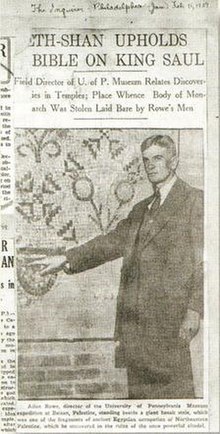Alan Rowe (archaeologist)
Alan Rowe | |
|---|---|
 Rowe in The Philadelphia Inquirer, 1929 | |
| Born | 29 October 1891 |
| Died | 3 January 1968 (aged 76) |
| Scientific career | |
| Fields | Archaeology |
| Institutions | Manchester University |
Alan Jenvey Rowe (29 October 1891 – 3 January 1968) was a British archaeologist most famous for his studies on ancient Egypt. Rowe was an Egyptologist and lecturer in Near Eastern Archaeology in Manchester University.[1][2]
Life
[edit]Born in Deptford and raised in Essex, Rowe's work included Egypt, Cyrenaica, Australia, Palestine and Syria.[3]
Career
[edit]Excavations
[edit]Between 1923 and 1925 he took part in a core expedition to Giza. He worked from 1928 to 1931 on the pyramid of Meidum, and surrounding areas, during this time he discovered the first royal necropolis built in a style of a royal court. His work ended due to the Great Depression of 1931.[4] In 1934 he led an expedition to Tel Gezer (midway between Jerusalem and Tel Aviv), but the locations identified for excavation turned out not to be workable.[5][page needed]
In 1938 he led a team from Liverpool University to the Pyramid of Athribis, unfortunately the structure was already in such a heavily damaged state, preventing more thorough examinations.[6] Between 1952 and 1957 Rowe surveyed and excavated tombs of the Necropolis of Cyrene, in the course of four campaigns.[2] Rowe was the first to make an extensive archaeological study of the Necropolis of Cyrene, however, many artifacts from his excavations are considered to be lost.[7] Rowe published extensive findings from excavating large parts of the Serapeum of Alexandria in 1956 together with B. R. Rees, including a detailed floor plan. Rowe and Rees 1956 suggested that statues found at the Serapeum of Alexandria and Memphis Saqqara, share a similar theme, such as with Plato's Academy mosaic.[8]
Publications
[edit]- The Four Canaanite Temples of Beth-shan, Beth-shan II:1, University Museum: Philadelphia, 1940.
- New Light on Aegypto-Cyrenaean Relations: Two Ptolemaic Statues Found in Tolmeita - l'Institut français d'archéologie orientale (1948).[9]
- A Contribution to the Archaeology of the Western Desert: IV - The Great Serapeum of Alexandria (1956) (with B. R. Rees).[8] in: Bulletin of the John Rylands Library; vol. 39
- A Contribution to the Archaeology of the Western Desert: I, II & III; in: Bulletin of the John Rylands Library; vols. 36 & 38
- Studies in the Archaeology of the Near East: I & II; in: Bulletin of the John Rylands Library; vols. 43 & 44
References
[edit]- ^ Meyers, Eric M., ed. (1997). "Rowe, Alan". The Oxford Encyclopedia of Archaeology in the Near East. New York: Oxford University Press. ISBN 9780199892280.
- ^ a b Thorn, James Copland (2005). The Necropolis of Cyrene: Two Hundred Years of Exploration. L'erma di Bretschneider. p. 47. ISBN 978-88-8265-339-2.
- ^ Thorn, James Copland (2015). "Alan Rowe: archaeologist and excavator in Egypt, Palestine and Cyrenaica". Libyan Studies. 37: 71–83. doi:10.1017/S0263718900004027. S2CID 165140364.
- ^ Silverman, David P.; Brovarski, Edward (1997). Searching for Ancient Egypt: Art, Architecture, and Artifacts from the University of Pennsylvania Museum of Archaeology and Anthropology. Cornell University Press. ISBN 0-8014-3482-3.
- ^ Henry Curtis Pelgrift (2016). "The History of Excavations at Tel Gezer". World History Encyclopedia.
- ^ Alan Rowe. "Short Report on Excavations of the Institute of Archaeology, Liverpool, at Athribis (Tell Atrib)." Annales du Service des Antiquités Vol. 38 (1938), p. 524.
- ^ James Copland Thorn (1994). "Reconstructing the discoveries of Alan Rowe at Cyrene". Libyan Studies. 25: 101–118. doi:10.1017/S0263718900006269. S2CID 164527194.
- ^ a b Alan Rowe & B. R. Rees (1956). "A Contribution To The Archaeology of The Western Desert: IV - The Great Serapeum Of Alexandria" (PDF). Manchester.
- ^ Alan Rowe (1948). "New Light on Aegypto-Cyrenaean Relations".
